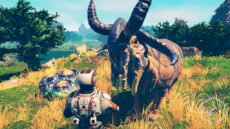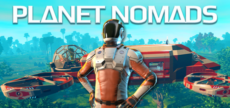Hello Nomads,
Work on the biggest update since we added survival back in March is going along nicely and the 0.7 should safely land on Steam and GOG next Thursday, 17th August. We're also hoping to have a beta branch of the update available on Steam couple days in advance. That way our most dedicated Nomads can help us with even more thorough testing to make sure the Thursday update doesn't break anything.
Now, last week we laid out what the update is going to entail - faster terrain generation without holes, new starting biome, crash-sites and beginnings of story, and reworked animals. In this post we'd like to focus on the animals and what behavior changes you can expect.
Climate-Based Breeds
We've always intended to have the animals adapt to the environment they inhabit. With the upcoming update, that's exactly what they're going to do. Depending on the climate, they will look different. And only the fiercest ones survive in the harsher conditions, so you'd better expect them tougher in the north.

Another Layer of Intra-species Diversity
Having only one specimen of each species doesn't make much sense. The world is diverse and a herd family should include females, males, alpha males and their offspring.
Every Dog Is Different
In nature, not every animal gets to be the alpha male. Younglings tend to stay with their mothers or near their homes. Others hunt to keep the herd alive. Similarly in Planet Nomads, every specimen has its own behavorial set. Let's take a look at some examples of these custom behaviors.
Alpha Males
As you'd expect, they are the biggest, toughest and most powerful of their pack. These don't know fear and trying to scare them off is pointless and usually ends up badly one way or another. Not every alpha male is the same either, but it is these ones you will often find wandering furthest from their nest. Or nearest your settlement if it's too close to their territory.


Males
While not the leaders, they still act as protectors and food bringers, so expect to meet them on hunting missions further away from their nests.
Females
Usually stay around their nests and look after the offspring, but for instance Nossal females are often known to be the main hunters of the pack.

Younglings
These will stick to the nests and other flock members. However there are more bold ones occasionally that stray further away from the nest. These make for the easiest source of fresh meat if their parents aren't around. Or if it's not little Branns that are even harder to hit than their parents.

Environmental Hazards
There's another completely new aspect coming to Planet Nomads and that's plants that will have a negative impact on your health, Nomads. Little is known about what exactly these newly growing plants entail and what level of threat they pose. Some are active at night, while others sleep at night and can be safely looted. It will be up to you to explore these new dangers and live to tell about the encounters.


Although the update isn't finished yet, the changes that have already made it in clearly show these new features will make playing Planet Nomads a completely new story. You're in for a treat, Nomads. Just one more week to get your hands on the 0.7 version. We call it Planet Nomads Awakening.
Have a good one!
Craneballs
![Planet Nomads [logo]](/wp-content/themes/planetnomads/resources/images/planetnomads.logo.png)






Leave a Reply